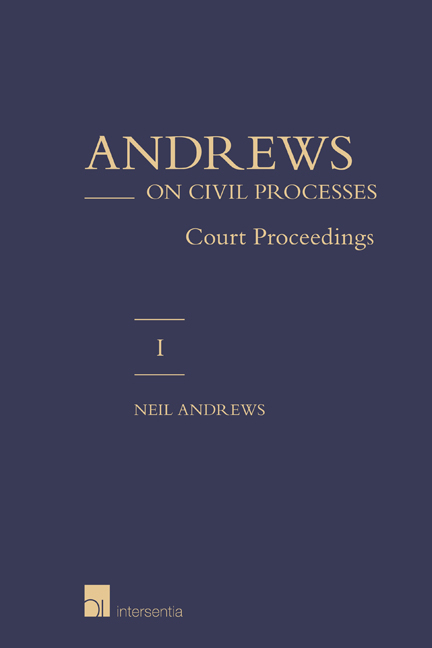Book contents
- Frontmatter
- Dedication
- Epigraph
- Preface
- Contents
- Table of Cases
- Table of Statutes
- Table of Statutory Instruments
- PART I INTRODUCTION TO THE FORMS OF CIVIL JUSTICE
- PART II COMMENCEMENT OF COURT PROCEEDINGS AND PREPARATION FOR TRIAL
- Chapter 4 The Six Phases of Court Proceedings
- Chapter 5 Commencement and Service
- Chapter 6 Pleadings and Parties
- Chapter 7 Counterclaims and Set-Off
- Chapter 8 Limitation of Actions
- Chapter 9 Case Management and Procedural Discipline
- Chapter 10 Pre-Trial Termination of Actions Without Settlement: Interim, Summary, Default, Preliminary and Striking Out Procedures
- Chapter 11 Disclosure
- Chapter 12 Privileges
- Chapter 13 Experts
- PART III END-GAME: TRIAL, APPEAL, FINALITY AND ENFORCEMENT
- PART IV COSTS AND FINANCING OF LITIGATION
- PART V SPECIAL PROCEEDINGS
- PART VI PRINCIPLES OF CIVIL LITIGATION
- PART VII THE EUROPEAN CONTEXT
- Select Bibliography
- Index to Volumes I and II
Chapter 7 - Counterclaims and Set-Off
from PART II - COMMENCEMENT OF COURT PROCEEDINGS AND PREPARATION FOR TRIAL
Published online by Cambridge University Press: 13 December 2017
- Frontmatter
- Dedication
- Epigraph
- Preface
- Contents
- Table of Cases
- Table of Statutes
- Table of Statutory Instruments
- PART I INTRODUCTION TO THE FORMS OF CIVIL JUSTICE
- PART II COMMENCEMENT OF COURT PROCEEDINGS AND PREPARATION FOR TRIAL
- Chapter 4 The Six Phases of Court Proceedings
- Chapter 5 Commencement and Service
- Chapter 6 Pleadings and Parties
- Chapter 7 Counterclaims and Set-Off
- Chapter 8 Limitation of Actions
- Chapter 9 Case Management and Procedural Discipline
- Chapter 10 Pre-Trial Termination of Actions Without Settlement: Interim, Summary, Default, Preliminary and Striking Out Procedures
- Chapter 11 Disclosure
- Chapter 12 Privileges
- Chapter 13 Experts
- PART III END-GAME: TRIAL, APPEAL, FINALITY AND ENFORCEMENT
- PART IV COSTS AND FINANCING OF LITIGATION
- PART V SPECIAL PROCEEDINGS
- PART VI PRINCIPLES OF CIVIL LITIGATION
- PART VII THE EUROPEAN CONTEXT
- Select Bibliography
- Index to Volumes I and II
Summary
INTRODUCTION
The present chapter examines, first of all, counterclaims made by the defendant against the claimant, especially if these exceed the value of the main claim. Secondly, set-off will be explained. This is a complex body of law, the essence of which is the possibility that a money action might be met successfully by a counter-plea that the claimant owes the defendant a sum of money, and that these cross-claims should result in an action for the ‘balance’ or ‘difference’.
COUNTERCLAIMS AND OTHER ‘ADDITIONAL CLAIMS’ UNDER PART 20
‘Additional claims’ under Part 20 cover a wide class of claims collateral to the main claim, notably: (i) counterclaims by defendants against claimants or against a claimant and another; (ii) claims by defendants against any person (whether or not already a party) for contribution, or an indemnity; or (iii) for some other remedy. In general, an additional claim under Part 20 must be treated as though it were a primary claim. The party bringing an additional claim is known as an ‘additional claimant’: this party cannot be the main claimant. However, the rules add special qualifications concerning service, case management, admission, and default judgment, and these detailed provisions must be studied closely. Service of an additional claim under Part 20 on a person renders him henceforth a party to the proceedings. ‘Additional parties should be referred to in the title to the proceedings in accordance with the order in which they are joined to the proceedings, for example, “Third Party” or “Fourth Party”, whatever their actual procedural status.’
This topic can be summarised in three propositions:
(i) there is no need for the court to grant permission for most types of additional claims under Part 20 made by a defendant, provided the defendant makes the claim when he files his defence;
(ii) however, a counterclaim against a person other than the original claimant requires the court's permission and the intended target of that counterclaim will need to be added as a new party;
(iii) permission to bring a Part 20 claim is not required if a defendant seeks a contribution or indemnity against an existing defendant provided the defendant makes the claim when he files his defence or within 28 days of the date when the relevant new defendant files his defence.
- Type
- Chapter
- Information
- Andrews on Civil ProcessesCourt Proceedings, pp. 125 - 144Publisher: IntersentiaPrint publication year: 2013



